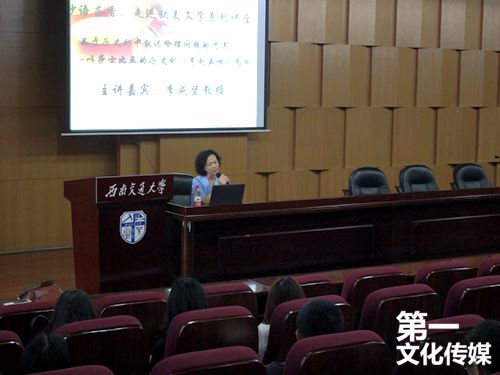The Students’ Affairs Office sponsored and the School of Foreign Languages hosted the lecture series of Reading European and American Classics. Prof. Li Chengjian, Dean of SFL, lectured on the narrative ethics in history plays with William Shakespeare’s Henry V as an example on May 21st, 2015.
As the most outstanding English writer, poet and playwright during the Renaissance, William Shakespeare wrote a number of works of enduring reputation. Prof. Li chose Henry V because, in addition to its controlled calmness and greatness in style, it reflects the English people’s awakening national awareness as well as their anxiety about the clash between the old culture and the new one. Prof. Li explained the root cause of such cultural anxiety by dialectically reviewing the social and cultural phenomena resulting from it. With the historical facts such as the Wars of the Roses, Prof. Li brought home to the audience the understanding that play is a powerful art form to eliminate the cultural anxiety and further to shape the England-centered ideology.
Apart from its historical significance, Prof. Li mentioned, Henry V has a far-reaching cultural importance. It is the story of Henry V, the King of England at the early 15th Century, intertwined with the story of the 2nd Earl of Essex, a favorite of Queen Elizabeth I, who led an expeditionary force to Ireland to put an end to the rebellion at the end of the 15th century. The innovative writing device employed in Henry V is called anachrony, a discrepancy between the order of events in a story and the order in which they are presented in the plot. With anachrony, the writer can not only depict historical facts, but also reflect the people’s view on the history and concerns about the reality. Take Henry V as an example, on the one hand, the cultural imperialism imposed by England on Ireland is depicted; on the other hand, concerns about the sharp contradictions between England and Ireland are presented.
However, anachrony raised questions for us: how to deal with the ethic problems of historical narration? And to what extent should historical facts be reflected? According to Prof. Li, in the era of globalization, post-modernism literature, calling for decentralization and deauthentication, requires a new literary order to prevent from chaos. She believed that literature, with its powerful initiative and social influence, plays a significant role in shaping ideology. History can be partially rewritten in literature so as to arouse empathy among the readers, but she emphasized that rewriting should be carried out very carefully and appropriately. Only when we show our respect to history can history be inherited.
In conclusion, Prof. Li encouraged the audience to form their own view, to enjoy and share, and to introspect while reading. The lecture ended in rapturous applauses, yet our enthusiasm in reading classics would sustain.
